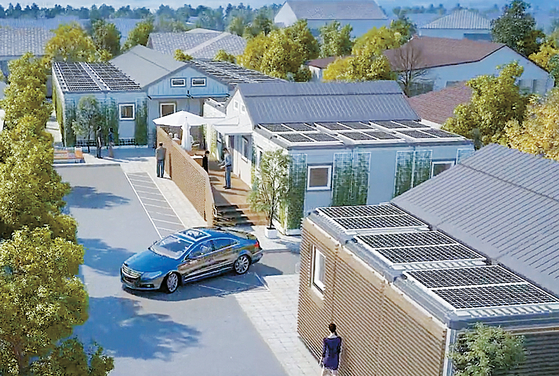
Enter LifeArk, a Korean-American company that is garnering attention for constructing homes of the future using plastic, a material often mistaken as a “source of pollution.” What sets the company apart is its ability to recycle plastic materials.
LifeArk was founded by Charles Wee, a Korean American, who, 20 years ago, aimed to build mobile homes for people in the Amazon jungle. The company’s treasurer, Paul Cho, joined forces with Wee. Wee, a UCLA graduate and architect by profession, turned to alternative housing development to provide people with adequate living spaces. Cho, formerly employed at Goldman Sachs, crossed paths with Wee during his search for meaningful work aligned with his faith and has been collaborating with him ever since.
The core structure of the homes created by this Duarte-based company is an 8-foot-square plastic foundation. The walls and roof are constructed using durable plastic materials, much like Lego blocks. According to the company, the roof is resistant to catching fire, even in the event of a large fireball impact, and the houses can be easily equipped with electricity and drainage systems.
The model house in El Monte, currently operated and managed by a nonprofit organization, functions as a shared dormitory with 200 square feet per unit, accommodating 20 individuals. The total materials and construction costs amounted to $190,000, significantly less than the $470,000 required for a traditional homeless shelter.
Due to the attention garnered by the El Monte unit, both the city and county of Los Angeles have shown interest in LifeArk homes. These homes offer increased durability and easier maintenance compared to pallet or steel container homes that local government agencies have previously utilized. Analyses have demonstrated their high effectiveness in housing and settling over 70,000 homeless individuals within the county and surrounding areas in a short period.
Recognizing the benefits and service philosophy of LifeArk, commercial real estate firm CBRE is assisting the organization in securing affordable land for additional plastic homes.
“The key lies in the fact that the homeless crisis has forced us to reevaluate how we can utilize plastics and address humanitarian crises,” explained Wee. “The concept of floating homes on rivers, conceived 20 years ago, has now emerged as a solution to homelessness in the United States.”
BY INSEONG CHOI [support@koreadaily.com]





